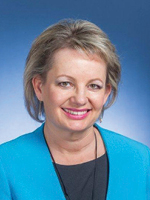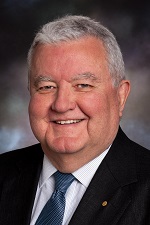 |
| Merck CEO Ken Frazier |
Wading into what has become an "argy-bargy" domestic political issue, Merck ($MRK) CEO Ken Frazier gave his two cents on why Australians miss out on new drugs--and then entered a wider debate about the bang the country gets for the bucks it spends on research.
Frazier, in an interview with the Australian Financial Review, said that even though the cancer treatment Keytruda (pembrolizumab) will be listed for reimbursement by Sept. 1, it took too long, and asked the government earlier this month to move the start date to August.
His comments, which were published June 29, come smack in the middle of a growing tussle between industry and Australia's Liberal-led coalition over efforts to trim drug reimbursement costs that widened last week as Health Minister Sussan Ley hit back at Medicines Australia over the approval times for newer treatments and related costs.
 |
| Australia Health Minister Sussan Ley |
Ley told reporters in Australia this week that drug companies are to blame for Australia having to wait up to 15 months for new medicines, according to a Sky News report, citing an independent review that found Australia lists drugs three months faster than Europe. The issue has also pitted the fiscally conservative Liberal-led coalition against sizeable public sentiment that public healthcare cuts and restrictions on reimbursement are not the way forward.
But Frazier has a wider case to make for an industry that sees itself on the cusp of a new class of drugs that will transform treatment options, while working with reimbursement systems in countries like Australia that often stick with less expensive, and older, treatments as therapies emerge that, while deemed clinically solid, may break the bank.
"If you look at a basket of drugs available in Australia--composed of drugs that are off-patent and drugs that are new, innovative drugs--I think you would find compared with the U.S., Australia vastly overpays for older commodity drugs. That creates a budgetary squeeze when it comes to new drugs [such as] Keytruda," Frazier said, as quoted by AFR.
Take that issue a bit wider in the region and it covers markets like Japan to an extent, but more importantly by the numbers, China, where approval of innovative drugs lags sharply and the government is making extensive efforts to change the way it buys drugs to spur innovation at home, particularly in oncology.
It also means lower sales for the most cutting-edge therapies globally.
Increasingly initial access to newer medicines in Asia are through regional medical hubs like Singapore's National Cancer Centre or other specialty clinics in the wealth city-state--and associated expenses are usually out-of-pocket.
A key issue then has been the costs charged by multinationals, but Frazier also had some Dutch Uncle advice for Australia on marrying research with commerce as the best way to attack that problem there.
"Australia is a great generator of intellectual property," Frazier said, according to the AFR. "It isn't a country that is taking advantage of all the great science that's done here. One has to ask oneself why it is you have so many patents being generated by fundamental scientific work being done in Australia, but not necessarily robust industry to capitalize on and commercialize those products. I would say a great part of that comes down to the policy environment. Tremendous basic scientific research is being done in Australia."
 |
| Australia chief scientist Ian Chubb |
The newspaper, citing Australia's chief scientist Ian Chubb, said that in the United States the collaboration between scientific research and industry sits about 70%. In Britain, it's about 40% and in Australia about 4%.
However, the government has said change has come--and it required a rejig of priorities, though the industry body Medicines Australia has also said the pace is too slow.
Earlier this year, Medicines Australia called for a more flexible and fast-tracked approach to approving new cancer drugs, for example, citing data that shows Australia ranked 18th out of 20 comparable countries on access to innovative new medicines.
But Australia's health ministry has said that reimbursement costs will cross A$50 billion by 2020 and include billions of dollars of new drug listings under the legislative package passed and that was made possible by lower costs paid for existing drugs, particularly generics.
"Consumers are the big winners from the passing of this package," Ley said last week.
The newspaper also highlighted that the debate will spill over to the Trans-Pacific Partnership (TPP) trade pact talks--with Australia one of the dozen nations in the pact and President Barack Obama recently winning fast-track trade status.
The Australian Financial Review said that the TPP has drawn scrutiny for the possible effects on drug prices and access.
"We don't know what's in it," said Brian Owler, president of the Australian Medical Association, according to the newspaper. "There's concern around how patents under the TPP can be extended. The cost of medication could go up."
- here are stories from the Australian Financial Review and Sky News